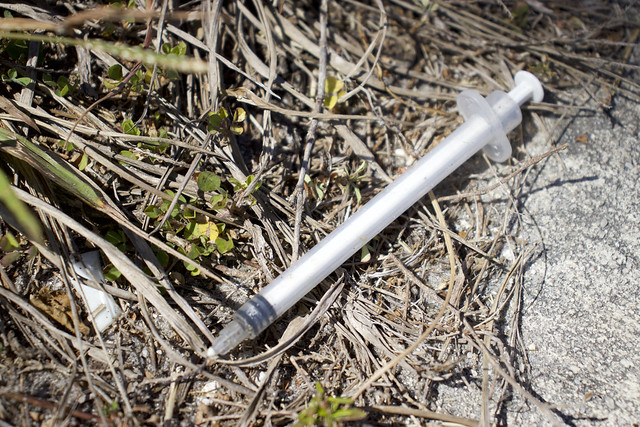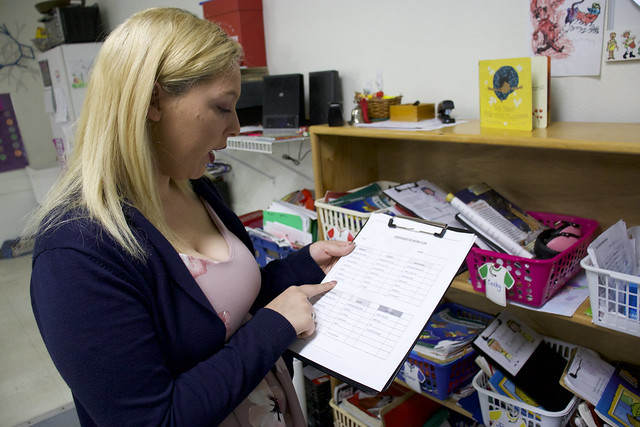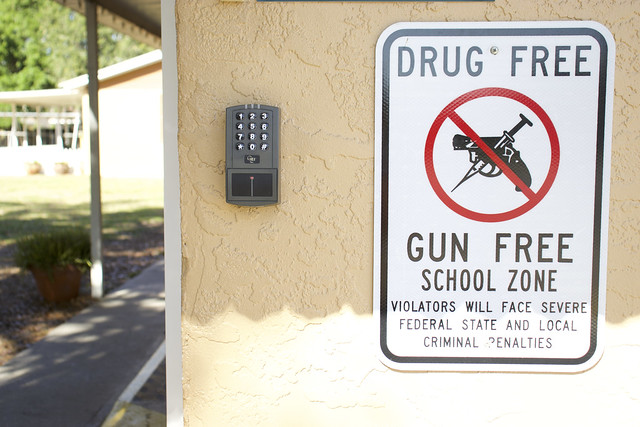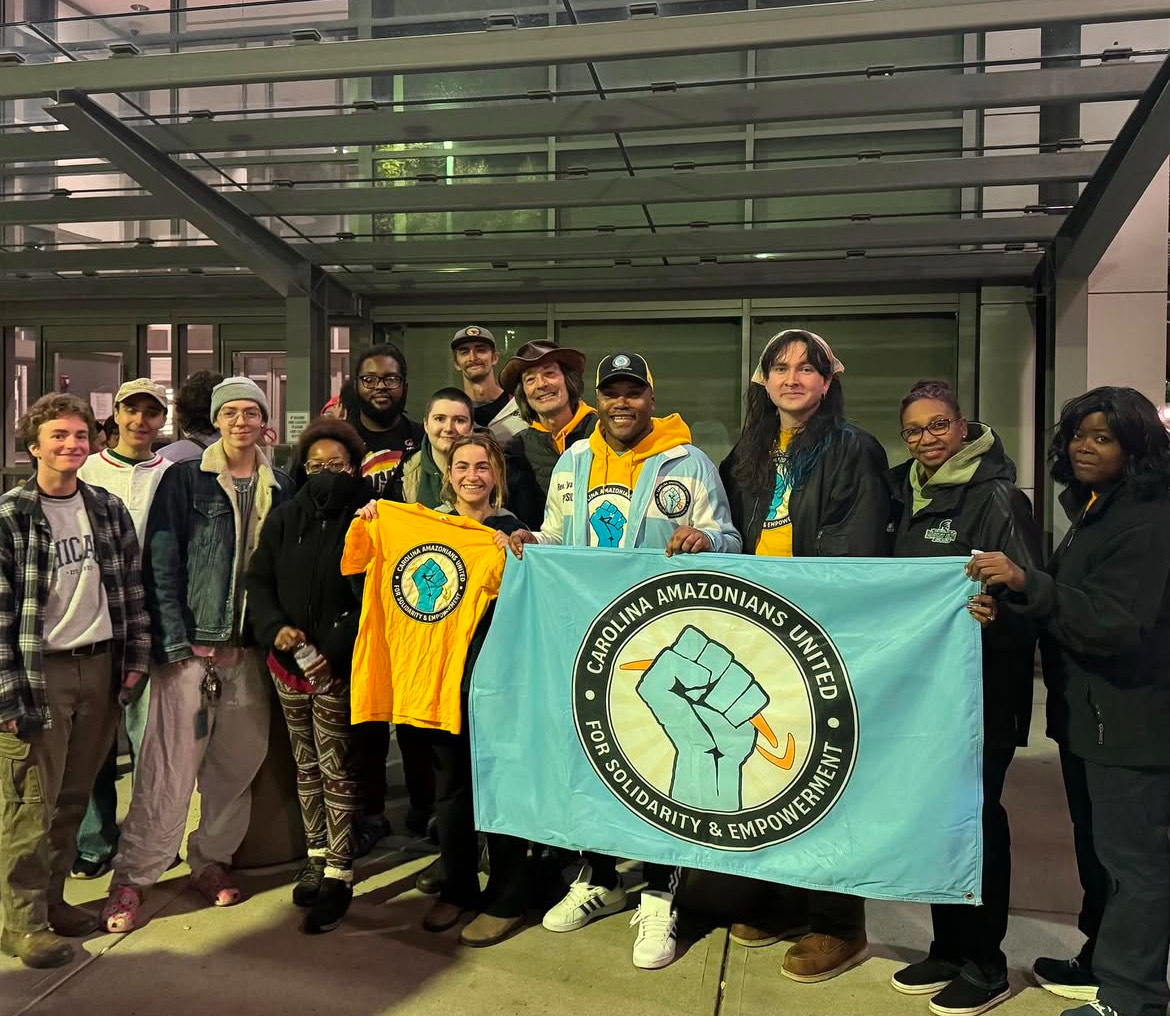Pasco County, Florida, is a primarily white middle-class community perfectly nestled between the Gulf of Mexico’s sunny beaches and Disney World. But despite being in the sunniest state and close to the happiest place on earth, it is clouded by addiction. Parents are getting high, children are being neglected and teachers are desperately seeking help as the opioid crisis unleashes its plague on the state of education.
Cynthia Ryalls-Clephane, 69, has been a school counselor in Pasco since 1992. There are countless cases, she said, of parents too high to even discuss their child’s well-being. She has seen students unable and unwilling to focus on their exams because their mom overdosed the night before and they were placed into a stranger’s home in the middle of the night. The teachers she works with are just getting more stressed, overwhelmed and defeated. They want to help, but the district and parents expect them to be foster parents, behavioral specialists, social workers, school counselors, personal tutors, life coaches and babysitters — on top of simply trying to teach students a basic curriculum between the hours of 8 a.m. and 3 p.m.
“I get kids that come to school who are homeless living in the woods. … Many times kids want to be at school because this is the safest place,” said Ryalls-Clephane. “I think about a variety of children that I’ve talked to teachers about. They feel helpless because the drugs are causing so many problems.”
Throughout the year, Child Protective Investigations receives approximately 7,500 allegations of child abuse and neglect. Most of those reports are submitted by teachers, school administrators and daycare facilities who can no longer handle the tolling effects of the opioid crisis. Multiple educators said they have countless students who have clearly not bathed, eaten or slept more than a few hours for days at a time. Others have seen students become violent, throwing desks, getting into fights and verbally abusing other students and teachers.
“They say some really horrific things to you. They call you every name in the book. They will physically aggress towards you,” said Sarah Merchant, a behavioral specialist and teacher at Schrader Elementary School. “If you don’t have a thick skin you can definitely become burnt out. We have had teachers who have had breakdowns.”
This above-average problem, teachers say, has taken over a seemingly average town. The county of roughly 525,000 people does not offer much entertainment aside from a couple of old movie theaters, Dairy Queen, Walmart parking lots and unkempt beaches littered with pollution. The median income is just over $48,000 and only about 53 percent of citizens are in the labor force, many of which work in education, retail or fast food.
The Sheriff’s Office said there were at least 140 reported overdoses in January and February alone, which is 59 more overdoses than that same time frame in 2018. Sixty percent of those were directly related to opioids. They find it hard to keep track of how many people are truly using because the demand for drugs — specifically opioids — is so high, but Capt. Mike Jenkins of the Pasco Sheriff’s Office believes 2019 will continue seeing a rise in overdoses.

U.S. 19, the main road through Pasco County, is a hub for overdoses and drug deals. This needle was found lying a few feet off the highway, surrounded by pieces of cotton gauze and shredded latex. Photo by Li Cohen.
“I liken it sometimes to whack-a-mole. There’ll be a source of supply, we whack that one down and inevitably … there’s someone who immediately fills that gap within a short period of time and then the cycle continues,” he said.
Even though the state and county have done a lot to combat opioid pills, he said there is still much more to do in regards to the illegal forms of opioids. “
“That solved one problem, but then that contributed to another issue. … If you do not address the demand issue something else is going to fill the void and fill the gap,” Jenkins said. “It’s just a matter of time.”
The office is also trying to handle the large number of opioid addiction cases where children are in the home. Over the past four to five months, Child Protective Investigations has had to remove 250 children from their homes because their parents or guardians were addicted to opioids, a problem that makes up 60 percent of all child removal cases in the county.
While CPI Director Ken Kilian said the department does their best to place children with family members, hundreds of children end up in foster care or staying with teachers until their parents can take them back.
“It’s not easy for a child victim who is witnessing their parents, their aunt, their uncle, suffer from this horrific disease,” Kilian said. “Addiction is extremely traumatizing and that has generational effects that we will see for years to come.”
And that trauma is expected to continue. As Kilian explained, the disease of opioid addiction is an endless cycle. The parents will continuously use, recover and relapse while the child develops behavioral and mental disorders they don’t understand and can’t control when they are at school. Then one day the parents take a dose a little too high. The child is left alone, hopeless and drained. They just watched their parents die and will have to go back to a school system the next day where the staff can’t help but mirror that same feeling.
Teachers feel more unprepared than ever
The school district is trying to help teachers by implementing Trauma Informed Care and the Harmony Project – initiatives that teach educators how to work with students and parents experiencing trauma and how to take care of themselves in dealing with that. Pasco schools social worker Danica Cockrell said being in a community that has high needs and high social deficits establishes an environment with drug use, poor mental health and a lack of communication. With the Trauma Informed Care, she hopes the schools will help teachers be prepared for what is expected to only get worse.
“It is no longer just coming to school to read, write and do math.’ We have to address and answer those social and emotional needs in order for students to be successful,” said Cockrell. I don’t think any school district will ever say that they are over-resourced or over-funded. … We are definitely a whole child and whole family perspective – we have to be.”
But teachers in the area believe this initiative is not enough. They say there are too many students per teacher given the extent of the issues. They want more resources and support. They are struggling mentally, emotionally and physically to keep up with what is asked of them.
Despite reaching out to nearly 50 current teachers in the county, only two would agree to speak and , only on the condition of anonymity in fear of losing their jobs or worsening their situation in the classroom.
One of those teachers has been with Pasco for 13 years and works at a Title I school. She said the impact of this crisis is difficult to truly assess. Countless students do not receive their basic needs, such as stable housing, food and clothing because of their parents’ addiction, she said.
“How can you support them and tell them it will be alright when they lose their homes constantly? When there is no food, no electricity, no clothes, backpack, school supplies,” she said. “Many of us staff say constantly this feels like a mental health facility, full of emotional and behavioral needs in a place that lacks resources and personnel.”
This gap has led to a severe teacher shortage in the district. There have been 50 teaching positions posted on the district’s website since January alone. On the first day of school last August, there were 66 open positions.
Teachers say it is increasingly hard to stick around when they don’t receive cooperation from students, parents and administrators. Merchant explained that in the behavioral unit at Schrader Elementary School, only three out of seven teachers returned to their positions this year. Replacing them has not been easy, as the replacements tend to be first-year teachers or are cross-certification teachers who earned bachelor’s degrees in a different academic area and are working on getting their teaching certifications.
“I don’t know there’s a lot of teachers that see this day in, day out for years because not a lot of teachers stick around,” she said, adding that teachers tend to have emotional and mental breakdowns because of the behavioral issues they experience with students. “I would say the breakdowns are probably once every month or two. … Every day, every other day we have major incidents.”
The second anonymous teacher worked in Pasco for more than a decade and only recently moved to another district after suffering physical attacks and threats from her third-grade students. She claimed she never received adequate assistance from the school, the district or parents and the support staff was “often underqualified or spread too thin.” She, and many other teachers, she said, often left their classrooms shaking, crying, and headed to therapy or the doctor for elevated stress.
“Teachers are under severe duress and pressure due to the workload expectations that are completely and humanly impossible,” she said. “We are charged with finding differentiated lessons to meet the needs of kids who are usually two to three years below grade level.”
She went on to say that administrators won’t write referrals for bad student behavior because it impacts the school’s overall grade and can create bad press. She has personally complained of threats from her students and administrators would not document them.
“Children who are severely neglected by unfit parents do not self-regulate and reason like kids from healthy, functioning homes. … We are trying to teach kids grade level standards when they are unable to focus, disrespectful, don’t care and know an adult at home doesn’t care,” she said. “Teachers fight a battle every day and we never win.”
Students try to take control
Ashley Dew was 12 years old when she found her dad was using opioids. Despite living most of her life in Pasco County, she felt that most of the people she grew up with, including teachers and school administrators, did not know how to help her.
Her experience as a student dealing with the opioid crisis led to her becoming a teaching aide at World of Montessori School in Pasco. The 19-year-old is surrounded by despair seeing children fight the same struggles as she did. Many of her kindergarteners and first-graders suffer from behavioral and neurological disorders because of their parents’ drug abuse. Drug deals occur within feet of the school’s locked gates.
“In the classroom you have your bad students … Talking non-stop. Always having to be the center of attention,” she said. “It breaks my heart. I have two brothers in my class and I know that they go through a lot because of their father with substance misuse.”

As a teaching aide at World of Knowledge Montessori School, Ashley Dew, 19, works with students to complete assignments and learn material that works with their mental and emotional state on any given date. This document helps students organize what they can and cannot handle given their situation for the day. Photo by Li Cohen.
The school does what it can to help. When students are overwhelmed – academically or personally – Dew and other teachers allows them to play with class pets, walk through a vibrant garden or have one-on-one talks with staff members. During her talks with students, Dew tries to help students cope with their parents’ situations and realize that they are not their parents’ caretakers. She, however, struggles to take her own advice and regularly chokes up when she reflects on her situation.
Dew watched her father, who she was once very close with, become a disheveled shell. Her relationship with her father became a couple of comments on Facebook and missed birthdays. There were days when she found it difficult to focus in school and on the days she needed the most help understanding her father’s choices, the school counselor did not have a spare moment to help.
“My father was never a bad person, but this drug issue changed him and changed us. … It hit me at my sweet 16. I didn’t have him come because every time I’m around him it was like talking to a stranger,” she said, wiping tears from her eyes. “I wanted that daddy-daughter sweet 16 dance but I didn’t get it. It’s sad waking up with anxiety like am I going to get that call – is he dead or alive.”
One of the worst parts of the situation for Dew was that she felt her multiple high schools never took her situation seriously. She often felt left in the dust and it took years for her to realize that there were others going through similar situation.
“I definitely don’t feel like [schools] take it serious. It’s like ‘Oh, your dad’s just a junkie,’ and that’s not true,” she said, adding that the first time she found help was at the PACE Center for Girls. “In public school you were lucky to even get in the counselor’s office. I think I saw my counselor once. … They just don’t really care.”
While Dew hopes that her school can set a new standard for how teachers and schools as a whole approach these issues, other students in the district are trying to help students better understand what opioids are, how they impact the body and how they can impact the future of the crisis in Pasco.
Jocelyn Meriwether is only 14 years old, but when the Bayonet Point Middle schooler opens her mouth to speak about the opioid crisis, her soft and high-pitched voice becomes a megaphone. After seeing a presentation on the effects of opioids by local youth-led organization Save Teens Against Drugs (STAND), she decided to get involved and has since worked her way up to vice president of the organization.
“Kids don’t understand the effects. They think, you did it for a day and if you don’t like it you never do it again,” she said. “But it’s not that simple; you can get addicted and then it follows you because you have that need for it and that want for it.”
As part of the youth-led organization, Meriwether goes to various events and speaks at conferences in Pasco. She wants students and parents to know the signs of substance abuse so they can help those who are struggling and spread awareness about the direct and indirect effects.
“Kids will get disruptive in classes and a big thing in our school right now is fights,” she said. “Disruptions is hard because the teacher gets involved and tries and stops it. It takes away from our learning time and our education.”
Meriwether n and the other STAND members are working with state legislators to get their organization involved with more schools and change prescription opioid legislation.
A community searches for a solution
Since 2016, Pasco County schools have gained more than 3,300 new pre-k to 12th-grade students among their 96 schools, according to the school district, but only one more instructional employee. There were 601 new support employees, including secretaries, bus drivers and custodians, as well as administrators.

Along with caring for students who are dealing with opioid abuse at home, World of Knowledge Montessori School in Holiday, Florida, is surrounded by drug deals and people under the influence coming within feet of the school’s property. Photo by Li Cohen.
While the district has an overall “B” rating by the state, the majority of the schools within the district are rated a “C,” meaning they are just meeting the standard requirements for student performance, learning gains, student attendance, and standardized test results. When schools and districts have higher grades, they receive more funding from the state and more control over what they can do with that money.
“Without the funding to put people in place to do threat assessments, to respond to students’ needs, we’re not going to be able to meet our goals or meet our responsibilities under the law,” said Public Information Officer Linda Cobbe. “People don’t know what the district does as a whole but they also don’t understand what teachers do in a day. … People say you get off for the summer, you only work 8 to 3. Why should you make even what you’re making. But it’s not just standing in front of a classroom and teaching.”
Cobbe and other school administrators are continuing to implement Trauma Informed Care, as well as more programs and trainings for teachers. Police have created a system that looks at opioid addiction as an illness, rather than a crime, and now focus on helping people recover from addiction. When they execute a search warrant at a home where they know there are addicts, for example, they bring health coordinators to talk and help addicts mentally process the situation.
Even still, overdose cases are increasing, as is the burden on educators and students.
Ryalls-Clephane said smaller class sizes may help. Per state legislation, pre-k through third-grade classes should have no more than 18 students; grades four through eight should have no more than 22; and grades nine through 12 should have no more than 25.
“I work in a school with 700 students and I’m the only school counselor there,” she said. “In my fifth-grade classes I’ve got 26 kids … One or two more make a huge difference. One with behavior problems makes a huge difference.”
Dew wants schools to realize how the behavioral and mental effects of dealing with the opioid crisis truly impacts her and the hundreds of other students and teachers. There should be more counselors and staff available that are thoroughly trained to speak with and help all members of the school.
“Every teenager feels like they’re alone if they’re going through a personal issue with substance misuse,” said Dew. “It takes a big part of their self-esteem out and they may think this is how my life is so this is how I’m going to grow up.”


Comments
how its changed from when I grew up there… fabulous article
Very well written and researched article!
Excellent article ! My wife and I were fortunate to work in the Pasco County School System for more than 33 years prior to retirement. Through the grace of working side by side with such caring faculty and staff members, students who faced this crisis were able to function to the best of their ability, and get through the day !
Our lawmakers should be ashamed of themselves by switching funding educationally by taking funds from our public schools and in a photo; clapping about it.
Yes, it is nice to see children succeed, but is wonderful to see children survive!
Staggering data in your article. It is amazing and sad that our school district is not doing more. The programs will be helpful, but it does NOT HELP THE TEACHER. Our job is loaded to address the many different person alities, learning styles, and levels, not to mention the “clerical” duties of plans and paperwork. We need a LEARNING FARM…a place where these students can feel safe. It takes a long minute to earn their trust, then u might teach some academics before the next sad event. I teach ADULT ED now and it all continues. I welcome an interview. May God bless all of us in our daily diligence.
I’m a small business owner in Pasco County and a youth leader at my church. How can I help???
If I can ever be of some assistance please reach out
I’d like to hear what CurtBrowning says he’s doing to support teachers in this reality. I’m a kindergarten teacher and am sick and filled with anxiety about whether or not I can make it thru tomorrow! I am a teacher of 24 years. The problem is where else can I go at my age of 62 to make the 48,000. I am single and strive to make ends meet! The Harmony project was a waste of time. Our staff is at an all time low of morale. We have such heart ache with the love for these trauma students, but cannot deal with them as the academic goals each year become higher. There is no time to laugh and bond with kids. It’s all about data so the district gets the funding. I have experienced my room totally being trashed by disturbed students. I pray prior to each day for patience and to show students I actually do care for each one. I am expected to meet so many needs with no support that I feel defeated before the day begins. I’d like to see how he would deal with my class. The pay is of course much less, so he wouldn’t even consider it, but perhaps he’d truly see just what teachers do for the love of children! This is teacher appreciation week, but we don’t get bonuses. Thankfully we get coffee, donuts, hot chocolate or candy bars from administrators.
It’s amazing how schools are underfunded and how the state lottery was supposed to take care of the schools….and that’s how we have all these lottery games to pay for our education system
I don’t doubt the issues are there but the author is way off on life in Pasco County.
“The county of roughly 525,000 people does not offer much entertainment aside from a couple of old movie theaters, Dairy Queen, Walmart parking lots and unkempt beaches littered with pollution”
That doesn’t accurately describe Dade City, Zephyrhills or even Land O Lakes (and Lutz nearby). Certainly doesn’t include Wesley Chapel or New Port Richey. Maybe the author should have visited other parts of Pasco County or specified which part they were describing.
An error of this magnitude makes me wonder about the rest of the article.